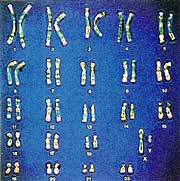So far, genes have been located on chromosomes: 22, 21, 20, 14 and y

British scientists have completed the deciphering of chromosome 6 which contains genes related to the human body's immune system. The chromosome, which at this stage is considered the largest chromosome in the body, contains about 166 million "letters", or chemical bases, which encode 2,190 different genes, about 6% of all the genomic information stored in the chromosomes.
The completion of the Human Genome Project was completed in April of this year. The project provided the scientists with billions of "letters" and now they are working to find which letters encode which gene on each chromosome. So far, genes have been located on chromosomes 22, 21, 20, 14 and chromosome 633. The British scientists, who reported the results of the research in the last issue of the magazine "Nature" claim that 6 of the genes on chromosome 1,557 are inactive and XNUMX genes are active. Less than half of the active genes are known to the world of science but the function of most of them is unknown.
"Chromosome 6 is rich in genes related in some way to the immune system," said Steven Beck, from the "Wellcome Trust Sanger" center in Cambridge in an interview with the news agencies. "These are genes that protect us from various disease agents. In fact, these genes determine whether we will survive an attack by a bacterium or a virus," he noted. Beck said that he and his team have located about 130 genes whose presence affects in one way or another the tendency of people to get or overcome diseases.
At the same time as the announcement by the British scientists, scientists from the University of Michigan in the United States announced that they had located a gene known as Bmi-1 that controls the ability of adult stem cells found in the central nervous system to renew themselves through redistribution (as opposed to embryonic stem cells that only survive for a few days).
Dr. Sean Morrison from the University of Michigan who together with his team published the research in the magazine "Nature" said that "the research raises the possibility that incorrect activation of the gene or its overexpression can lead to uncontrolled growth of the cell and later to cancer".
